Today is Cheesefare Sunday (Sirni Zagovezni in Bulgarian) with Lent starting as of tomorrow. By a tradition, Lent season lasts seven weeks and ends at Easter. The day that marks the start of the longest period of abstention in the Christian Orthodox calendar is Cheesefare Sunday. In different parts of Bulgaria it goes by different names – Proshka – (forgiveness) Sirnitsa, Sirni pokladi, Sirna zaproshka (all of them derived from the word for cheese sirene), Zapokladi, Orata, Pustove… Cheesefare Sunday has its invariable rituals performed from morning till night.
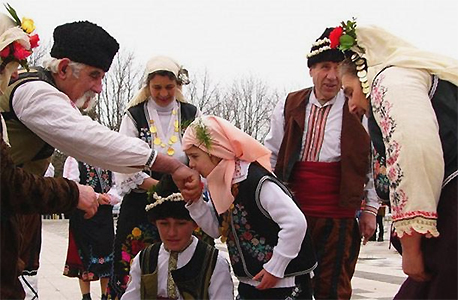 Of course, there is one thing that never varies on Cheesefare Sunday – the table laden with food that brings together the whole family. But before that another ritual is performed – the ritual of asking for forgiveness. Once it used to be performed throughout the week preceding Cheesafare Sunday, known as Cheesefare Week. Asking for forgiveness was a custom that took place in the evening and the hierarchy was strictly observed – it was the young that sought forgiveness of the old. Young families would go to their parents’ house, newlyweds – to their best man. They would bow down low, kiss their elder’s hand and say: “Forgive me!” The customary answer was: “God forgive! You are forgiven! May you be forgiven!” After exchanging these words, they would all sit down at table together. And this was repeated at every house they went to. Forgiveness had to be sought of every single person in a higher position in the community. And, of course, to be given. It was only then – reconciled and forgiven – that people could begin feasting. This custom is still observed in our day, it has even been spreading in past decades. Even Bulgarians living abroad find a way to ask their loved ones’ forgiveness. And then to lay the table with the different kinds of food mandatory on this day, wherever they may be living.
Of course, there is one thing that never varies on Cheesefare Sunday – the table laden with food that brings together the whole family. But before that another ritual is performed – the ritual of asking for forgiveness. Once it used to be performed throughout the week preceding Cheesafare Sunday, known as Cheesefare Week. Asking for forgiveness was a custom that took place in the evening and the hierarchy was strictly observed – it was the young that sought forgiveness of the old. Young families would go to their parents’ house, newlyweds – to their best man. They would bow down low, kiss their elder’s hand and say: “Forgive me!” The customary answer was: “God forgive! You are forgiven! May you be forgiven!” After exchanging these words, they would all sit down at table together. And this was repeated at every house they went to. Forgiveness had to be sought of every single person in a higher position in the community. And, of course, to be given. It was only then – reconciled and forgiven – that people could begin feasting. This custom is still observed in our day, it has even been spreading in past decades. Even Bulgarians living abroad find a way to ask their loved ones’ forgiveness. And then to lay the table with the different kinds of food mandatory on this day, wherever they may be living.
Cheesefare always falls on a Sunday. Throughout the morning the young make their rounds, seeking and being given forgiveness. The women of the house would prepare dinner. According to ethnographer Dimitar Marinov the festive fare would include fish, fish pie, butter, eggs and different kinds of banitsa. All dishes were prepared using butter, eggs and milk – products that would be prohibited throughout Lent. (Meat was excluded on Meatfare Sunday – one week before Cheesefare Sunday). In our day Lent is not the obligatory convention it once was. Restricting animal products over the entire 49-day period is now a matter of choice.
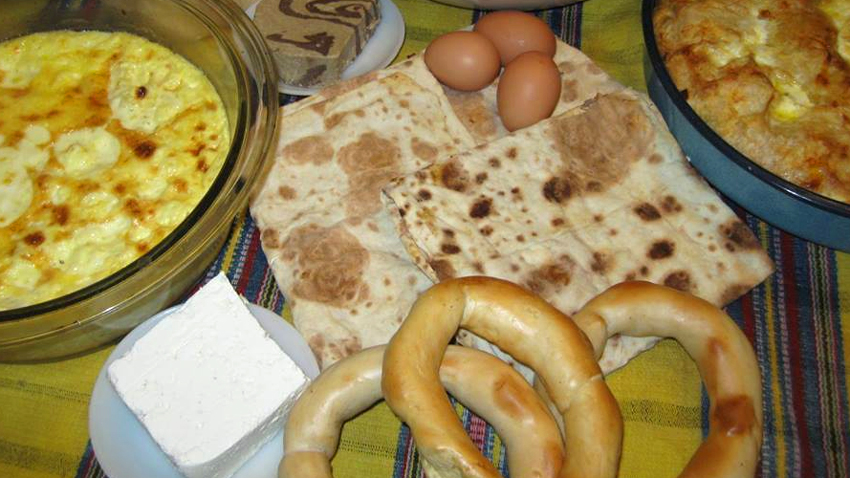
Nonetheless, on Cheesefare Sunday the table is traditionally laid with the above mentioned dishes. Before sitting down to table, the younger members of the family ask forgiveness of their elders. Once the women of the house gave food to the poor. Then the fun would begin – the ritual of hamkane that followed the meal, traditionally performed with boiled egg and white halva. Though it actually entered Bulgaria later, white halva is a must on the Cheesefare table. The egg or the halva are stringed up by a red thread or martenitsa and suspended from the ceiling. A piece of charcoal is tied a little higher up on the same piece of string. In some parts of the country cheese (or halva) is tied to the string after the egg.
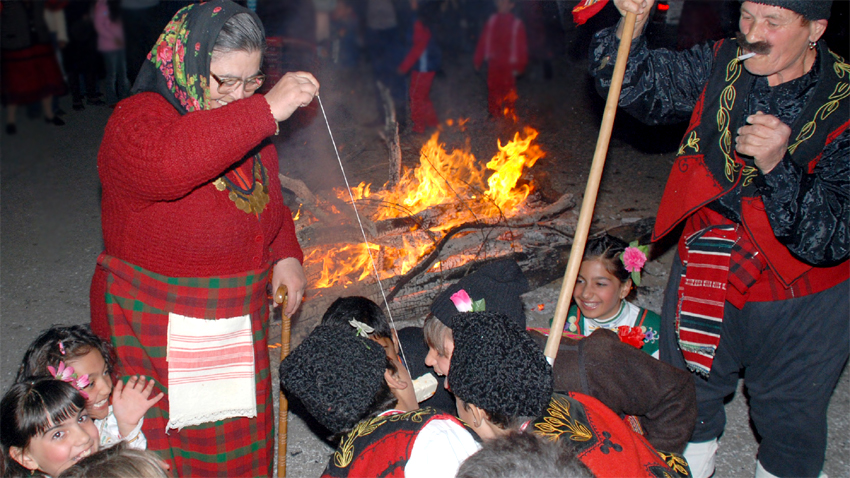
The string is then swayed and all the people around the table have to try and catch the charcoal, egg or cheese without using hands, just their mouth. Afterwards the piece of charcoal is put away to be used for curing disease or for breaking evil spells. Only the white of the egg would be eaten, the yoke and cheese would be put away – again to be used as a cure. The string they were suspended from was set on fire several times with an incantation – for wheat, for maize, for the stock, for the beehives etc. If it starts to burn faster after the wheat is mentioned, for example, that bodes a bumper harvest. There were also incantations for a boy or a girl from the household - if the string burnt quickly, they would soon be wed.
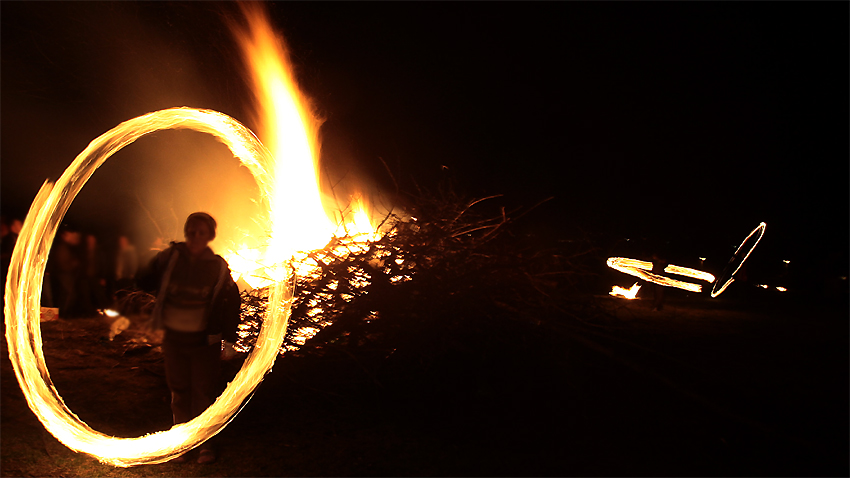 Another typical custom was called Oratnik. Like many other rituals it is known by different names in different parts of the country. In the region of Samokov, for example oratnik is the word used to denote a cleft log with straw stuffed between the two halves. The straw was set on fire, the log was twirled with an incantation, followed by words not entirely decent. On the whole, Cheesefare Sunday is connected with some quite bawdy incantations and rhymes connected with lads and lasses from the village who were readily recognizable. Straw bonfires were lit on high ground outside the village.
Another typical custom was called Oratnik. Like many other rituals it is known by different names in different parts of the country. In the region of Samokov, for example oratnik is the word used to denote a cleft log with straw stuffed between the two halves. The straw was set on fire, the log was twirled with an incantation, followed by words not entirely decent. On the whole, Cheesefare Sunday is connected with some quite bawdy incantations and rhymes connected with lads and lasses from the village who were readily recognizable. Straw bonfires were lit on high ground outside the village.
The boys would jump over them while the girls danced the horo. While the fires were burning the young men would shoot off rifles so there would be more lambs, more bees etc. In some parts vine slips, juniper twigs or tobacco sprigs would be added to the straw and it would then be made into a big stack. These stacks are called sirnitsi. What were known as katranitsi were also made, consisting of pieces of tarred cloth (katran being the word for tar). Then they too were lit so as to spread even more light. Sometimes the katranitsi (the containers used to keep tar in for oiling the cart) would be taken out of the house on that night and placed somewhere high. In the region of Sofia straw would be tied to long poles and would then be set on fire.
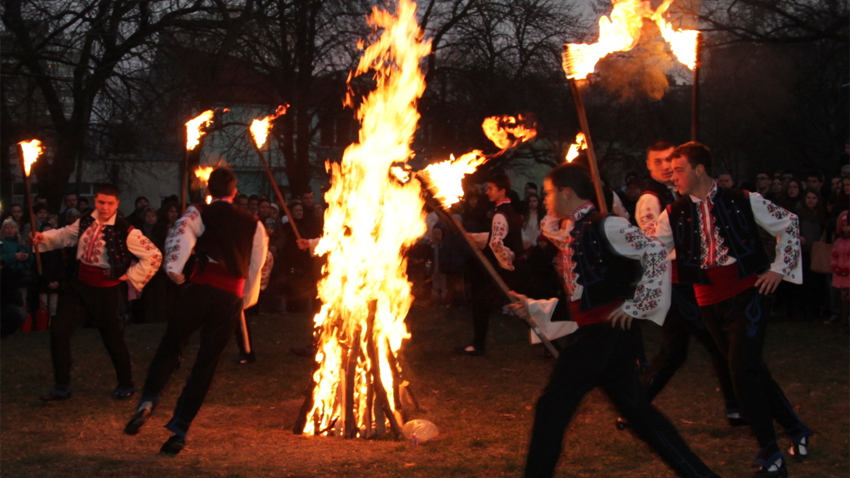
On Cheesefare night the young who were betrothed but had not married during winter could part ways until autumn came and the first working bee – a way to regain their freedom and choose a different spouse. Another ritual connected with the creative power of fire is called chilkane or tuykane of arrows. Each young man would make dozens of arrows called pernitsi because of the feathers (pero) on their rear end. The arrows had sharp tips and the feathers were tarred. Shooting an arrow was no simple thing; that was why the older lads would start teaching the youngsters on St. Athanasius day (January 18); before that date this was prohibited. Once the oratnik was lit, the young man would leap over it and only then would he send arrows with burning feathers in the direction of his beloved’s house. And he would name each arrow – the first one was for God, then for the girl he loved, then for his parents… The households had a great many containers filled with water ready – to put out the burning tokens of love. Wet rugs would be draped over the roofs. The lads would try and send the arrows into the yard of their girls’ house, but often they would aim at other girls’ yards as well. Come morning, the girl’s family would carefully collect and count the arrows that had fallen into their yard – a measure of their daughters’ popularity.
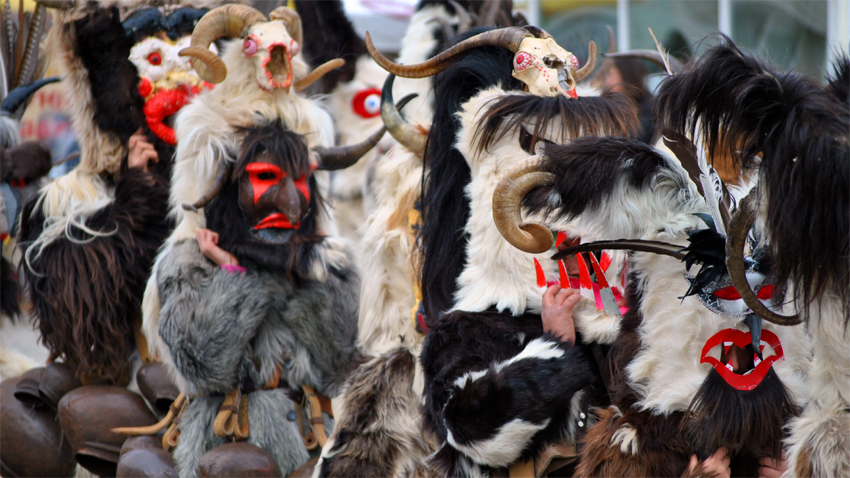
On the Monday after Cheesefare Sunday, called Kukerovden (kukeri - mummers) gangs of masked men would start making their rounds in many parts of the country – unmarried as well as married men dressed up in women’s clothing. It was believed that the clamour of their bells and the masks they had on their faces would banish the forces of evil from the Earth and open up the gates to a new beginning.
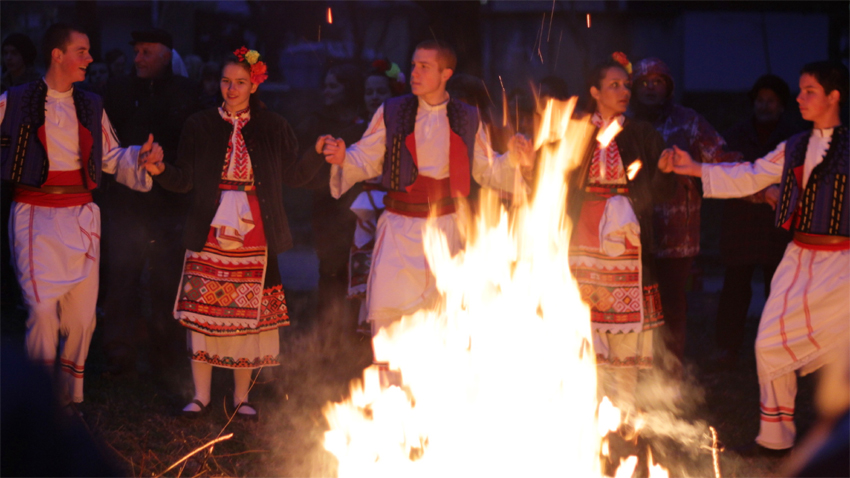
English version: Milena Daynova
The Youth Centre "Zahari Stoyanov" in the town of Dobrich, Northeastern Bulgaria, is organizing a folklore meeting of communities on the occasion of the International Day of Tolerance. The aim of the event, which will take place from today to 17..
The Bulgarian folklore dance group Vito Horo from Perth will take part in the multicultural women’s festival Harmony of Colours, taking place tonight in the Australian city, the Bulgarian association Rodina has announced. Besides the Bulgarian..
The resort towns along Bulgaria’s Black Sea coast can be broadly categorized into two types: modern ones, characterized by their lively and colorful streets, and port cities with a rich history. Various settlers have passed through these port towns,..
The Youth Centre "Zahari Stoyanov" in the town of Dobrich, Northeastern Bulgaria, is organizing a folklore meeting of communities on the occasion of the..

+359 2 9336 661
